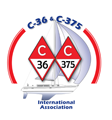I purchased my boat earlier this spring. My boat has only been in fresh water. I sail in Lake Michigan. The boat is now on the hard outside with a winter cover. When I winterized the engine raw water system, I used 5 gallons of RV anti-freeze, but I just found out it does not hava a corrosion inhibitor. The boat is 5 hours aways from where I live. Do I need to get back on board, re-install water pump, connect batteries, and re-flush with 5 gallons of RV anti-freeze with a corrosion inhibitor, or will I be OK until next spring?
Since my raw water system has lake water in it all summer long with no corrosion inhibitor, I was susprised to later read in the engine manual, that I am supposed to use anti-freeze with a corrosion inhibitor. Is that requried, or just a nice thing to do for added protection?
Thanks,
Ken Enstrom
Valkyrie
Sister Bay WI
Ken Enstrom
2004 C-36 MKII #2199
Tall Rig, Wing Keel, M-35B
S/V Valkyrie - Sail Great Lakes

Ken,
Larry copied me on your question to him and I responded to you this morning via email regarding my thoughts.
I will share them with the rest of the clan so we may get more input on my feeble thought processes.
I beleive that the since the heat exchanger is made of noble materials copper, brass and bronze it will not see much benifit from a corrosion inhibiter.
The engine exhaust manifold is a cast iron nickle alloy that to is quite resistant to corrosion. Also consider the fact that many of us in warmer clime's keep their boat in the water all year long, most in salt water. Failures of these components other than from electrolosis is rare.
My personal opinion is that you should go have a beer and think about sailing in the spring.
Steve
Cepheus dream
C36 MK I # 825
MK I Tech Editor No Mas
Ken,
You may be confusing the raw water cooling system with the closed loop cooling system. The closed loop system is very similar to the one in your car. It needs to be filled with a good grade of corrosion inhibiting antifreeze. There is an overflow tank in the port settee locker in case you haven't run across it yet.
Don't worry about the raw water system, it is designed to be resistant to warm salt water, which is pretty corrosive stuff. the RV antifreeze is not going to do it any harm. You may want to consider changing the zinc in the heat exchanger once a year just to be on the safe side.
BTW, I leave the pump in place. when winterizing. I have one of my kids pour antifreeze into the strainer while I run the engine. They keep pouring it in until it comes out the exhaust and I call it done.
Dave.
Dave
Ballena 1995 Mk II #1445
I say again, this Forum is a powerful tool!
Ken's question was initially about the raw water system, and when he emailed me I urged him to post here on the Forum, confident that persons smarter than me would come up with an authoritative answer. So I really appreciate Dave's and Steve's fast responses.
Let me reiterate that being a "member" of the Forum, though, is not the same as being a (paid-up) "Member of the C36IA." Participating at both levels is very much worthwhile, of course. After all, we are all here to help reinforce the value of the Catalina 36 fleet. Translated, that means supporting the value of [U]Your Boat[/U]. Please participate at both levels.
Larry Brandt
S/V High Flight #2109
Pacific Northwest, PDX-based
2002 C-36 mkII SR/FK M35B
Dave -- Thanks for the reply. I did in fact mean the raw water system and not the closed engine water system. I too was surprised to see in the engine manual detail to use RV anti-freeze with corrosion inhibitor. It seemed to me that if the raw water system can take regular lake and salt water, that regular RV anti-freeze should be enough. After reading the engine manual though, I thought possibly there is something in regular RV anti-freeze that would be bad for the raw water system. Case closed. I'm not going to worry about it.
Thanks, Ken Enstrom
_________________________
[QUOTE=dwarburton;3109]Ken,
You may be confusing the raw water cooling system with the closed loop cooling system. The closed loop system is very similar to the one in your car. It needs to be filled with a good grade of corrosion inhibiting antifreeze. There is an overflow tank in the port settee locker in case you haven't run across it yet.
Don't worry about the raw water system, it is designed to be resistant to warm salt water, which is pretty corrosive stuff. the RV antifreeze is not going to do it any harm. You may want to consider changing the zinc in the heat exchanger once a year just to be on the safe side.
BTW, I leave the pump in place. when winterizing. I have one of my kids pour antifreeze into the strainer while I run the engine. They keep pouring it in until it comes out the exhaust and I call it done.
Dave.[/QUOTE]
Ken Enstrom
2004 C-36 MKII #2199
Tall Rig, Wing Keel, M-35B
S/V Valkyrie - Sail Great Lakes
[I]You may want to consider changing the zinc in the heat exchanger once a year just to be on the safe side. [/I]
To be "on the safe side," check it quarterly at least. If you wait a year and most of the zinc is gone you may find out you can't remove the rest of the zinc, which requires a tiresome removal of the entire heat exchanger. Once you start checking it quarterly, then you can develop your own routine check schedule.
Stu Jackson, C34IA Secretary, C34 #224, 1986, SR/FK, M25 engine, Rocna 10 (22#)